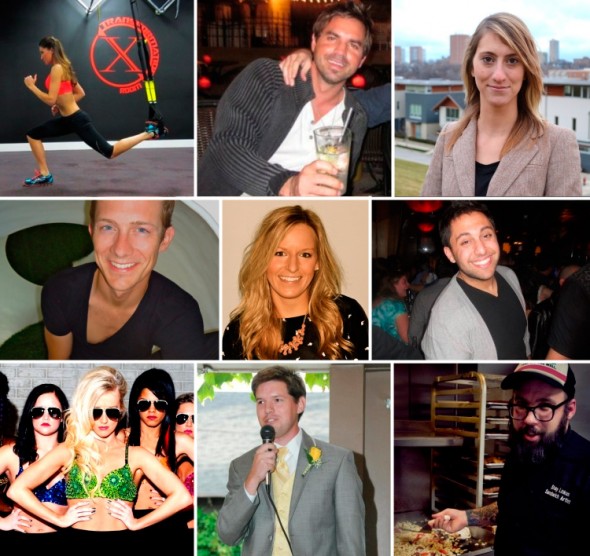Tips for Twenty-Somethings
How to get hired and be a success in the healthy food and nutrition industry -- or in any field of endeavor.

Twenty-Something Newaukeeans of the Week
Go to any of the healthy food, nutrition, and agricultural conferences that are going on all over the place nowadays and what do you see? Hordes of young twenty-somethings who want to make healthy food their life’s work. Yet I keep hearing how hard it is to get a real, paying job in this field. There’s no doubt it’s not a job seeker’s market right now. But don’t let that stop you. Here are some tips and advice for people trying to get their foot in the door in this field or in any other industry.
- Give yourself some time: It’s perfectly fine, normal even, to work as a waiter or barista while trying to figure out your next move or even what you want to do. Most established standup comedians say it took five years of endless touring and obsessive refinement of their craft before they were able to make a living at it. When you know what you want to do, it all will boil down to how badly you want to do it.
- The highlight reel: Remember that everyone has a highlight reel that makes your unedited life pale in comparison. Nearly everyone in their twenties is insecure; some hide it better than others. Sometimes the most courageous thing to do is admitting it to yourself or to someone else. Confidence will come later, in your thirties or even forties.
- It’s never too early to work on your leadership skills, even if the only person you’re leading is you. Look at the managers where you work now. How do they run meetings? Are they awake or non-awake? Do they make you feel like a robot or an irreplaceable part of the team? Why? How do they give praise? How do they give critical feedback? How would you do their job?
- “Know thyself.” Keep a journal and write every day.
- Know how to market thyself: Write and memorize an elevator speech that describes who you are and what you want to do in 10 seconds. Because you never know when you might end up in an elevator with someone like Will Allen. Prepare for your interviews. Glean as much information as you can about the company. Arrive at the interview with at least five questions. Google “hardest interview questions,” write down your answers, memorize and rehearse them with your friends.
- Mistakes: Everyone makes them. Don’t let them haunt you. If they do, get professional help.
- Education is a credential, but more importantly a way to learn how to think critically. The only thing a four-year degree shows me is that a job applicant can make and fulfill a long term commitment. What they majored in doesn’t concern me so much. What I look for is an ability to communicate and think independently. In my ten years at Fondy, most of the best people I’ve hired were English majors.
- If you’re still in college, major in fields that excite you and not necessarily in fields that promise the highest salaries. The world is littered with wealthy, unhappy people.
- Cultivate optimism: Good things happen more often to optimistic people. I think it’s because they’ve taught themselves to be on the lookout for these good things and recognize opportunities quickly. But if it’s in your nature to see the glass as half empty, you can change if you work at it every day.
- Planning is overrated: It’s fine to plan, but stay flexible and ready to pitch it out the window if an opportunity presents itself.
- If you’re not scared, you’re not pushing yourself. This will never change as you go through life.
And when you find work promoting healthy food, nutrition, or sustainable agriculture, here are some qualities that I think are missing in our movement. Do these things and you will make a lasting impact, and you will start moving up the ladder.
- Buy low, sell high: Easy to understand, much harder to execute. Anything can be solved if you throw enough money at it, but in the nonprofit world there is never enough money. My most valuable staff members are the ones who do a lot with a little. And it’s not because they work harder. They work smarter.
- Under-promise, over-deliver. It’s always better to surprise people than disappoint them.
- Be wary of experts who codify things and set rules and techniques in stone. Knowledge is always expanding. Those who don’t embrace new techniques or incorporate new knowledge are going to be left in the dust.
- It’s fine to be ambitious, but try not to climb over people. Naked ambition won’t make you friends. Being lonely is no fun.
- Don’t play the “Me Too” game. Learn what your competition does badly, then make that one of your core strengths. Quietly.
- Learn why as you learn how. Even when you’ve been tasked with something as mundane as entering names into a donor database, try to learn why what you’re doing is going to help your nonprofit agency develop and flourish. See the bigger picture.
- Make sacrifices and pay your dues, even when no one is looking. I’m certain that all of Milwaukee’s food movement leaders can tell you about early times when they had to lick two thousand envelopes all by themselves or drive to Waukesha at a moment’s notice to shovel truckloads of free compost.
- Embrace ambiguity. For example, raw food and juicing is the hot trend right now. But for the past two years I’ve been resisting it because I don’t agree with the things that proponents of raw food have been saying. Claims like “heat from cooking kills beneficial vegetable enzymes” aren’t supported by mainstream science, and when raw food enthusiasts tell me that it’s how human beings originally ate things, I like to point out that the average life expectancy back then was 50 years. But I’ve begun to change my view. There is no denying the health benefits of eating raw vegetables and Fondy Farmers Market is going to start supporting it this summer.
- Learn the histories that weren’t included in your high school history textbooks, especially if you’re working in disenfranchised neighborhoods. History books are written by people in power and the mainstream media’s representations of “low income” communities are tainted by those lenses. Learn the neighborhood-level micro-histories by talking with people one at a time. What you learn may not be 100 percent accurate or verifiable in an academic sense, but knowing the realities and lived experiences of people in your community will help you understand the reasons why people do things a certain way. You will make better decisions and have a lasting impact.
Recent Urban Foodie Articles
Urban Foodie
-
The Junk Food Debate
 May 14th, 2013 by Young Kim
May 14th, 2013 by Young Kim
-
Why Hmong-Grown Produce is Different?
 Dec 5th, 2012 by Young Kim
Dec 5th, 2012 by Young Kim
-
Eating With The Season
 Oct 21st, 2012 by Young Kim
Oct 21st, 2012 by Young Kim





















Good stuff Young! I might add a complementary view for the budding entrepreneurs among your readers. If you’d rather be your own boss than get hired, many of Young’s pointers still ring true. Often the best first step toward entrepreneurship is to work for somebody else first. You will be a much better business owner if you learn the ropes with others. If you are ready to take the leap – now is a great time to innovate in the food and beverage sector. I would just stress the importance of coupling idealism and good ideas with a solid living business plan. You need to know your market inside and out and have a conservative and realistic plan mapped out. Do your homework and do math. Risk is inherent, but you can choose to forge ahead foolishly or manage risk wisely. Sometimes doing it yourself is the right strategy and Milwaukee may just be waiting for you.
Young Kim,
Great advise, very wise for young foodies and non-foodie types. I mildly disagree with Juli Kaufmann. I think you can start a business without much more than passion and an idea that excites you. The business plan can evolve. But this method only works if your survival skill are in place, if you invest a manageable amount of cash and can get by, maybe with a part-time job. If you allow a “trial by fire” approach with time and if you’re true to your passion, a smart business plan like Julie’s is the next step.
Good additions Deborah, I totally agree with you. If you can start small and grow organically/ incrementally and have access to a sufficient amount of funding to make that possible, I absolutely say YES! I guess it could really depend on the nature of the business. I am a big advocate of trying- with intention, if you can afford to take a leap of faith.
Good points, both of you. A successful enterprise has to based on gut instinct/passion and solid numbers. And Milwaukee’s Big-Town-Not-Small-City nature makes it the perfect place to try groundbreaking things.
Good stuff. Applies to any age, not just people in their 20’s.
As the active Master Food Preserver for Milwaukee County, I just taught a class last night about the details of Wisconsin’s Pickle Law (which, in a nutshell) allows for small category of food producers to bring their processed, acidified foods to market under strict guidelines.
What I tell budding food entrepreneurs is this:
1. Be creative. Ideas are abundant and grow fertile with honest work. Don’t fall prey to the narrow thinking of “me too” or ” x is successful doing y…so I’ll do that too.”
2. Be scrupulous about your methods; using the highest standards of food safety at all times.
3. Be honest in all your dealings. Milwaukee is a big small town with a long memory.
4. Be open in sharing your experiences (and hearing about others). My Father-in-law has a saying, “It’s good to learn from your mistakes; it’s better to learn from someone else’s.”
5. Give credit when and where its due. You didn’t invent the wheel.
6. Be part of your community. Because you already are a part of your community!